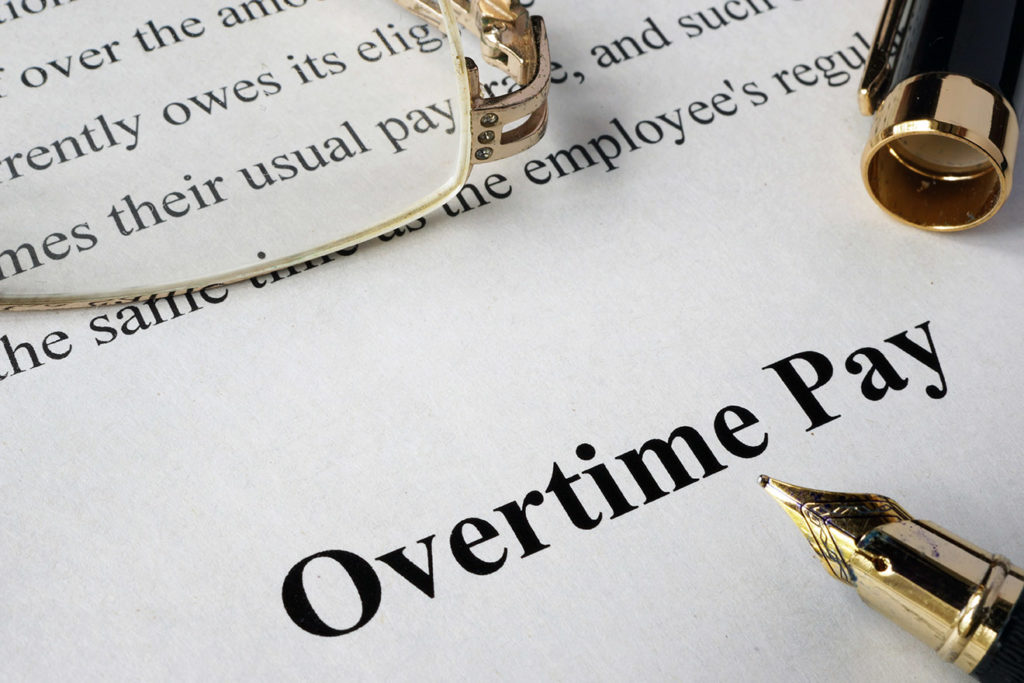If you are paid by the hour, your livelihood may, in part, be dependent on your overtime income. When it comes to overtime compensation, employers are required to follow both state and federal requirements.
Are You Eligible for Overtime Compensation?
On a federal level, your employer must comply with the Fair Labor Standards Act, 29 U.S.C. § 203, et seq. In general, the FLSA requires your employer to pay you 1.5 times your hourly wage for every hour over 40 that you work during a workweek. However, there is a caveat: you must be a “non-exempt” (i.e. eligible) employee.
So, this begs the question – what kind of an employee is “non-exempt” (eligible for overtime) versus “exempt” (not eligible for overtime)? The answer is, the regulations list what types of jobs are exempt (ineligible), so if your job does not fall into one of those categories, then you will likely be eligible for overtime. The U.S. Department of Labor publishes a comprehensive list of these non-eligible employees who are not eligible for overtime, but here are a few of the most common examples:
- Executive, administrative, professional, and outside sales employees (including teachers and academic administrative personnel in elementary and secondary schools);
- Commissioned sales employees;
- Employees in certain computer-related occupations;
- Employees of certain seasonal amusement or recreational establishments;
- Farmworkers employed by anyone who used no more than 500 “man-days” of farm labor in any calendar quarter of the preceding calendar year;
- Casual babysitters and persons employed as companions to the elderly or infirm;
- Parts-clerks and mechanics servicing autos, trucks, or farm implements, who are employed by non-manufacturing establishments primarily engaged in selling these items to ultimate purchasers; and
- Domestic service workers living in the employer’s residence.
Your “exemption” may be dependent on your salary as well as your job duties. (The FLSA is under the process of increasing the salary exemption from $455 a week to $679 a week.) If you think you may fall within one of the exemptions, you can visit this DOL site to learn more about whether you are eligible for overtime compensation.
Apart from your “exemption” status, it may be the case that, because of the nature of your profession, the FLSA permits your employer to define your workweek differently than the typical 8-hour, Monday through Friday, workweek. For example, hospitals and residential facilities may classify your workweek as 14 days rather than the traditional seven-day workweek.
To make matters even more complicated, Connecticut has its own fair labor standards act that regulates overtime compensation differently for many jobs. See Conn. Gen. Stat. § 31-76i. It’s important to double-check how Connecticut’s provisions impact you.
Unfortunately, employers do not always abide by the federal and state FLSAs. It is not uncommon for an employer to improperly characterize its employees as “exempt,” when the job should be overtime eligible. If this is the case and you regularly work more hours than your workweek requires, you should consider speaking with an experienced employee rights attorney.
So, if you are eligible for overtime, are you receiving the income you earn?
Another common problem is that employers sometimes incorrectly calculate overtime pay. This means that you might not be adequately paid for the amount of overtime that you have earned. Both the federal and state laws require employers to pay eligible employees overtime pay at a rate of at least 1.5 times the employee’s regular rate of pay. Since Connecticut’s minimum wage is $10.10 per hour, this means non-exempt, minimum wage worker should receive at least $15.15 for each hour over 40 that is worked in a workweek.
The calculation is a bit different for employees who also receive piece work payment. In those cases, overtime pay is 1.5 times the employee’s rate of pay computed “by dividing the employee’s total earnings by the number of hours in the usual work week.”
Contact Us
Overtime compensation can be critical to earning a living, but it can also be difficult to navigate. You may be entitled to overtime but are not receiving it. Or you may find it hard to decipher whether the numbers you see on your pay stub are accurate calculations. If you are you concerned that you are not receiving overtime pay due to you, please contact Garrison, Levin-Epstein, Fitzgerald & Pirrotti, P.C. We can review your situation and help you get the compensation you deserve.
